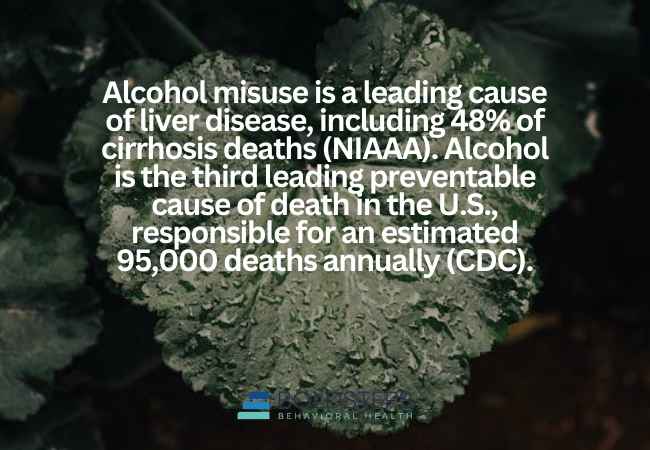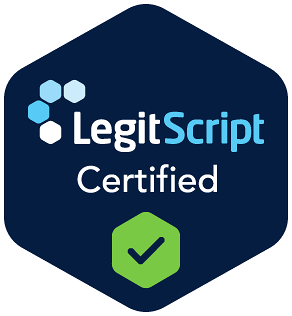Alcohol addiction, or alcohol use disorder (AUD), is a widespread and devastating condition that affects millions of people worldwide. It’s a complex disease that not only impacts the individual but also their family, friends, and community. While overcoming alcohol addiction may seem like a daunting task, recovery is possible with the right support, treatment, and determination. At Bold Steps Behavioral Health, we provide a full continuum of care to help individuals take bold steps toward a healthier, addiction-free life.
In this comprehensive guide, we’ll explore alcohol addiction, its challenges, and the treatment options available to help you or your loved one on the path to recovery.
Understanding Alcohol Addiction
Alcohol addiction is a chronic condition characterized by compulsive alcohol use, loss of control over drinking, and a preoccupation with alcohol despite adverse consequences. It’s not simply a lack of willpower; it’s a disease that alters brain chemistry, creating physical and psychological dependence.
The Prevalence of Alcohol Addiction
- Approximately 15 million Americans aged 12 and older struggle with alcohol use disorder (AUD) (NIAAA, 2020).
- Only about 10% of individuals with AUD receive the treatment they need.
Signs and Symptoms of Alcohol Addiction
Recognizing the signs of alcohol addiction is the first step toward seeking help. Common symptoms include:
- Drinking more or longer than intended.
- Persistent desire or unsuccessful attempts to cut down or control drinking.
- Neglecting responsibilities at work, school, or home due to alcohol use.
- Developing tolerance, requiring more alcohol to achieve the same effect.
- Experiencing withdrawal symptoms like nausea, sweating, or irritability when not drinking.
- Continuing to drink despite harm to relationships, physical health, or mental well-being.
If you or a loved one exhibits these signs, it’s essential to seek professional help through an Alcohol Addiction Treatment Program.
The Challenges of Alcohol Addiction Recovery
Recovery from alcohol addiction is a complex process that often requires addressing physical, psychological, and social challenges. Understanding these challenges can help individuals prepare for the journey ahead.
1. Physical Challenges
Withdrawal Symptoms:
The body becomes dependent on alcohol over time, leading to withdrawal symptoms when drinking stops. These symptoms can range from mild (headaches, nausea) to severe (delirium tremens, seizures), making detoxification a critical first step.
Health Consequences:
Chronic alcohol use can damage the liver, heart, and brain, leading to long-term health complications that may require medical care during recovery.
2. Psychological Challenges
Cravings:
Intense cravings for alcohol can occur during recovery, making relapse a common risk without proper coping strategies.
Emotional Triggers:
Stress, anxiety, or unresolved trauma can serve as triggers, increasing the likelihood of returning to alcohol use.
Co-Occurring Mental Health Conditions:
Many individuals with alcohol addiction also experience conditions such as depression, anxiety, or PTSD, which must be addressed for successful recovery.
3. Social Challenges
Stigma:
The stigma surrounding addiction can prevent individuals from seeking help, leading to feelings of shame and isolation.
Social Pressure:
Events and environments where alcohol is present can make maintaining sobriety challenging, especially in early recovery.
Steps to Achieve Alcohol Addiction Recovery
Recovery is a journey that requires a combination of professional treatment, self-determination, and a supportive environment. At Bold Steps Behavioral Health, we guide individuals through every phase of recovery with evidence-based care and compassion.
1. Seek Professional Help
Acknowledging the need for help is the most important step. Professional treatment through an Alcohol Addiction Treatment Program provides the tools and support needed to overcome addiction safely and effectively.
2. Detox Safely in a Medical Detox Program
Detoxification is the process of eliminating alcohol from the body. This stage often involves withdrawal symptoms, which can be life-threatening without medical supervision. Our Medical Detox Program ensures a safe and supportive environment during this critical phase.
Benefits of Medical Detox:
- 24/7 medical monitoring to manage withdrawal symptoms.
- Medications to ease discomfort and prevent complications.
- Emotional support to reduce anxiety during detox.
3. Choose the Right Treatment Program
After detox, individuals transition into structured treatment programs that address the root causes of addiction and provide the tools for long-term recovery.
Partial Hospitalization Program (PHP)
Our Partial Hospitalization Program offers intensive, structured care during the day while allowing patients to return home in the evenings. PHP includes:
- Individual and group therapy sessions.
- Medical monitoring and holistic treatments.
- Skills training for relapse prevention.
Intensive Outpatient Programs (IOP)
For those balancing work, family, or other responsibilities, our Intensive Outpatient Programs provide flexibility while maintaining a structured treatment plan. IOP focuses on:
- Addressing emotional triggers and cravings.
- Developing healthy coping mechanisms.
- Providing peer support in group therapy sessions.
Outpatient Treatment Program
Our Outpatient Treatment Program is designed for individuals in the later stages of recovery or those with mild addiction. This program provides ongoing support through:
- Regular therapy sessions.
- Continued focus on relapse prevention.
- Access to community resources for sustained sobriety.
Virtual Treatment Program
For those who prefer the convenience of receiving care from home, our Virtual Treatment Program offers high-quality therapy and support online. This option is ideal for individuals with busy schedules or mobility challenges.
Therapeutic Approaches in Alcohol Addiction Recovery
At Bold Steps Behavioral Health, we use a combination of evidence-based therapies and holistic practices to help individuals develop the skills needed for long-term sobriety.
Evidence-Based Therapies
- Cognitive Behavioral Therapy (CBT): Helps individuals identify and change negative thought patterns and behaviors related to alcohol use.
- Dialectical Behavior Therapy (DBT): Focuses on managing emotions, building resilience, and improving relationships.
- Trauma-Informed Care: Addresses unresolved trauma that may contribute to alcohol use.
Holistic Practices
- Mindfulness and meditation to reduce stress and improve emotional regulation.
- Nutritional counseling to restore physical health.
- Exercise programs to promote overall well-being.

Behavioral Health Treatment in New Hampshire
Alcohol addiction often coexists with mental health disorders. Our integrated Behavioral Health Treatment in New Hampshire addresses both conditions simultaneously, ensuring comprehensive care.
Dual Diagnosis Care
Dual diagnosis treatment focuses on:
- Managing mental health conditions like anxiety, depression, and PTSD.
- Providing strategies to cope with emotional triggers without alcohol.
- Ensuring overall mental and physical well-being.
The Role of Family and Community in Recovery
Recovery is not just an individual journey—it’s a family and community effort. Support from loved ones and peers can significantly enhance recovery outcomes.
Family Involvement
At Bold Steps, we involve families in the recovery process through:
- Family Therapy: Rebuilding trust and improving communication.
- Education: Helping families understand addiction and their role in recovery.
- Support Groups: Providing a space for loved ones to share experiences and receive guidance.
Community Resources
Engaging with local recovery-focused communities provides accountability and encouragement. Resources include:
- Peer support groups like Alcoholics Anonymous (AA).
- Sober living homes for a stable, alcohol-free environment.
- Volunteer opportunities to rebuild a sense of purpose.
Why Choose Bold Steps Behavioral Health?
Choosing the right treatment provider is crucial for successful recovery. At Bold Steps Behavioral Health, we stand out for our compassionate care and comprehensive programs.
What Sets Us Apart
- Personalized Treatment Plans: Tailored to meet the unique needs of each individual.
- Full Continuum of Care: From detox to outpatient services, we support every stage of recovery.
- Experienced Professionals: Our team includes licensed therapists, addiction specialists, and medical staff.
- Convenient Options: Including Virtual Treatment Programs for flexibility and accessibility.
- Safe Environment: Located in New Hampshire, our facilities provide a supportive, judgment-free space for healing.
Conclusion
Recovery from alcohol addiction is a journey of courage, commitment, and transformation. It’s about more than just stopping drinking—it’s about regaining control of your life, rebuilding your health, and finding the support you need to succeed.
At Bold Steps Behavioral Health, we’re here to guide you every step of the way. Whether you need a Medical Detox Program, an Alcohol Addiction Treatment Program, or ongoing support through an Outpatient Treatment Program, we provide the tools and resources to help you achieve lasting recovery.
Take the first step today. Call us at (603) 915-4223 to learn more about our programs and services. Together, we can take bold steps toward a healthier, addiction-free future.
FAQ on Alcohol Addiction Recovery
What are the signs of alcohol addiction?
Signs of alcohol addiction include:
- Drinking more or longer than intended.
- Cravings for alcohol or inability to stop drinking.
- Neglecting responsibilities due to drinking.
- Withdrawal symptoms like nausea, sweating, or irritability when not drinking.
- Continued drinking despite harm to health, relationships, or finances.
How does medical detox help with alcohol addiction recovery?
A Medical Detox Program provides 24/7 medical supervision to manage withdrawal symptoms safely. It’s the first step in recovery, ensuring physical stabilization before transitioning to further treatment.
Can alcohol addiction be treated alongside mental health conditions?
Yes, many individuals with alcohol addiction also experience co-occurring mental health disorders such as anxiety, depression, or PTSD. At Bold Steps, we provide integrated Behavioral Health Treatment in New Hampshire to address both conditions simultaneously.
What is the difference between PHP, IOP, and outpatient programs?
- Partial Hospitalization Program (PHP): Offers structured, intensive care during the day while allowing individuals to return home in the evenings.
- Intensive Outpatient Programs (IOP): Flexible treatment for those balancing recovery with work or family commitments.
- Outpatient Treatment Program: Provides ongoing support for individuals in the later stages of recovery.
How can family members support someone in recovery?
Family involvement is crucial for long-term recovery. At Bold Steps, we offer family therapy and education to help loved ones understand addiction, rebuild trust, and create a supportive environment.
What makes Bold Steps Behavioral Health unique?
We offer personalized care plans, a full continuum of services, and evidence-based therapies in a compassionate, judgment-free environment. Our location in New Hampshire provides a safe space for healing and recovery.


